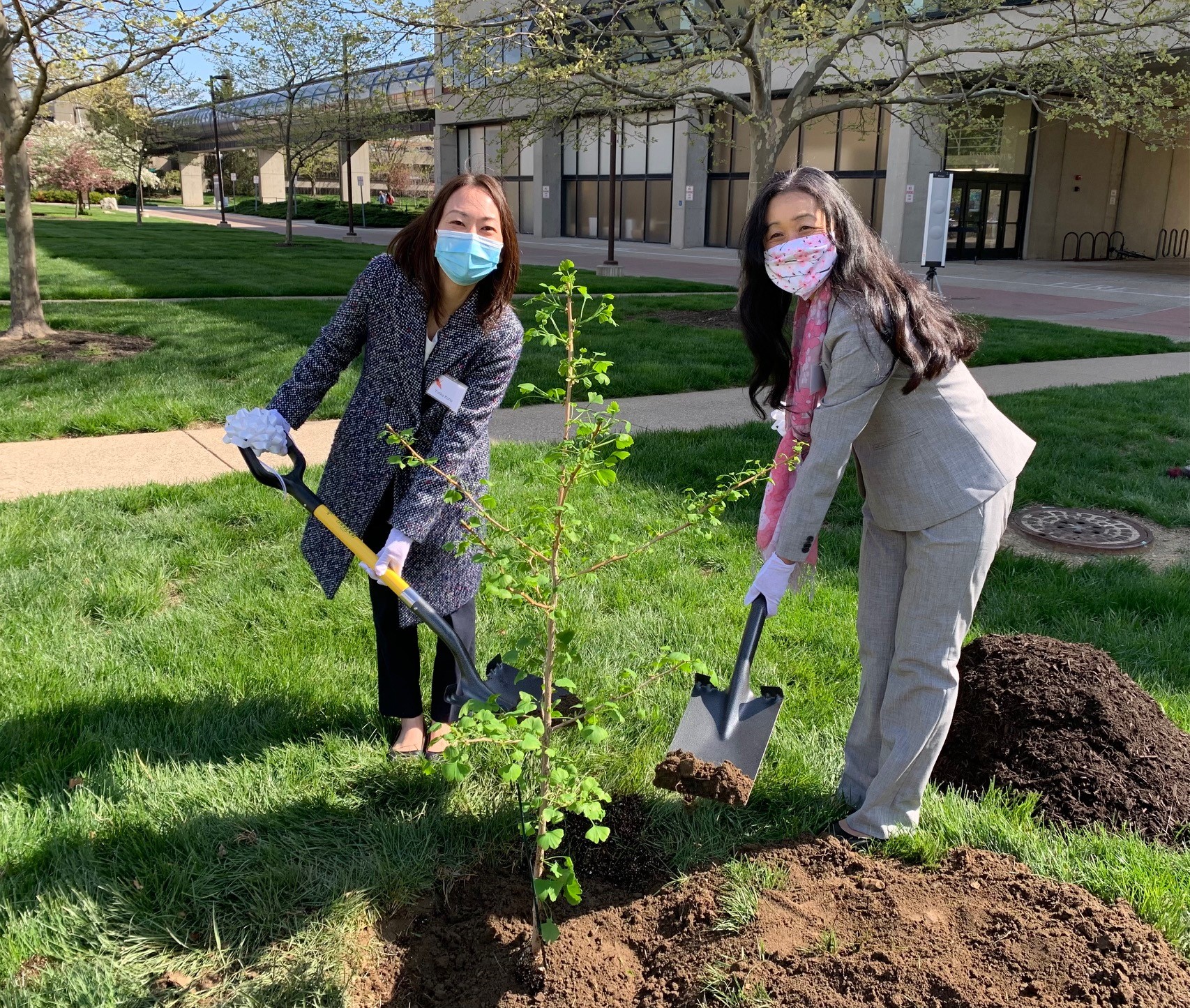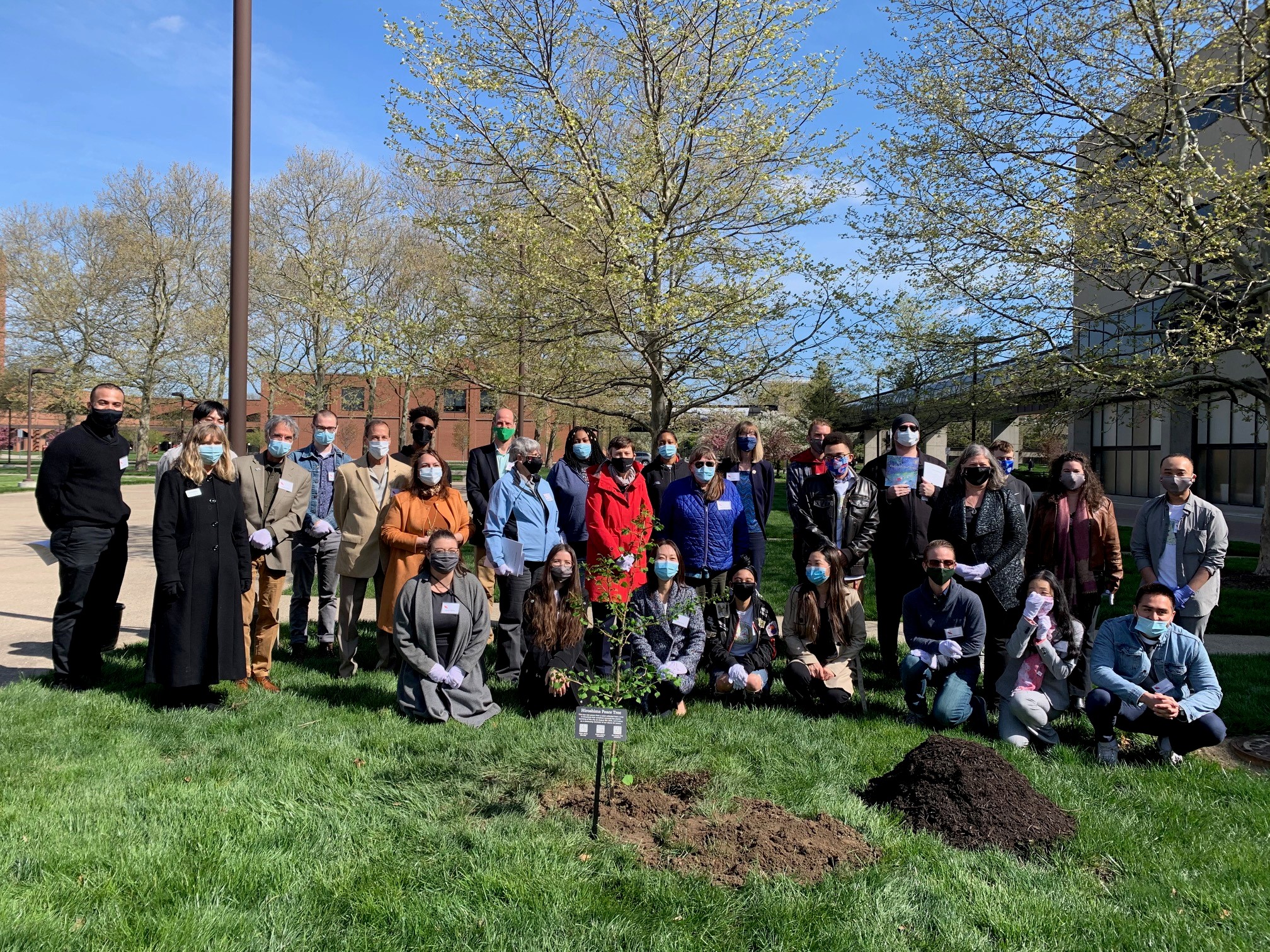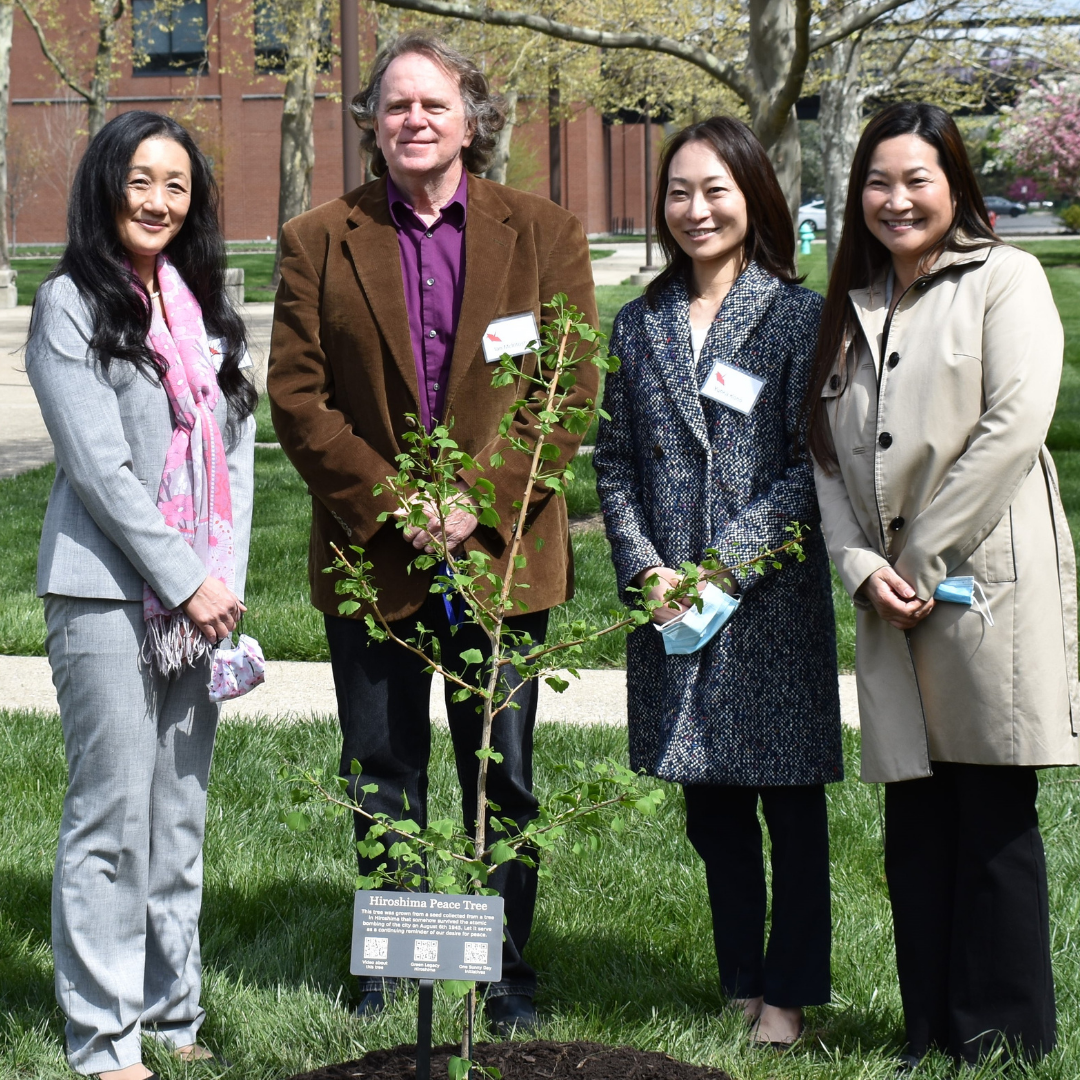Hiroshima Peace Project Tree
Message of Peace from Hiroshima: SDG 16
The Japanese Studies Program in the School of Liberal Arts at Indiana University Indianapolis, along with students and faculty, welcomed a special group of guests for a unique event. Together, they planted a sapling that had grown from the seeds of a remarkable tree in Hiroshima, Japan, which had endured the atomic bombing of the city in 1945, surviving for over 300 years! This sapling is part of the Green Legacy Hiroshima project, dedicated to promoting global peace and imparting knowledge about the far-reaching impacts of nuclear weapons. IU Indianapolis' involvement in this initiative is a collaborative endeavor between the Japanese Studies Program and the Office of International Affairs.


The Indiana University Indianapolis Japanese Studies Program, led by Dr. Keiko Kuriyama, in partnership with the Indiana University Indianapolis Office of International Affairs and the Indiana University Indianapolis Greenhouse, are cooperating with the Hiroshima Green Legacy Project to bring seeds from the few remaining trees that survived the Hiroshima A-Bomb blast of 1945 to the IU Indianapolis campus and across Indiana. Linked to UN Sustainable Development Goal 16 on peacebuilding, the Hiroshima Green Legacy Project (summarized in this YouTube video) was established to spread the seeds of Hiroshima's A-Bomb ‘survivor trees’ worldwide as a gesture of reconciliation and peacebuilding.
With the planting of this 3-year-old sapling on the Indiana University Indianapolis campus alongside Democracy Plaza in Taylor Square, IU Indianapolis became active ambassadors of this peace message. The goal of the Indiana University Indianapolis Japanese Studies Program is to educate the public on the devastating consequences of nuclear weapons and thus contribute to the United Nations goal of promoting peaceful and welcoming societies at the national level, and cooperation at the international level. The next stage of the project is to share more Hiroshima seeds and seedlings with other communities in Indiana, including secondary schools, colleges, churches, parks, and arboretums.
The planting ceremony at Indiana University Indianapolis was attended by senior IU Indianapolis administrators and faculty members in the School of Liberal Arts, and community dignitaries, including Jeremy Kranowitz, the director of Keep Indianapolis Beautiful, and Charlie Wiles, the director of the Center for Interfaith Communication. See an excerpt from the official press release below:
Click to view the full press release
Ginkgo tree with historic roots in Hiroshima is planted as a symbol of peace at Indiana University Indianapolis: News at IU: Indiana University
Amber Denney
...The highlight of the event, which was organized and managed with the help of students in E384: East Asian Nationalism and Cultural Identity, a class taught by Dr. Izumi Harris, was the heart-felt presentations by students. Their personal reflections on the impact of the bombing of Hiroshima and Nagasaki through music, art, poetry and other forms of expression was described by them as their own personal ‘peace declaration.’
The origins of the planting at Indiana University Indianapolis go back to March 2020 when the Japanese Studies Program hosted the "Hiroshima Nagasaki A-bomb Poster Exhibition" at the Cultural Arts Gallery at the IU Indianapolis Campus Center, along with a symposium "Hibakusha (Survivor) testimony: Hiroshima 1945 to the U.S. 2020". The symposium included the testimony of Dr. Hideko Tamura, an A-Bomb survivor and founder of One Sunny Day Initiatives. A Hiroshima Peace Ambassador, Dr. Tamura is also an ambassador for the Hiroshima Green Legacy Project, which is where the idea for planting the tree at IU Indianapolis was born.
The Spring E384 class taught by Prof. Izumi Harris included zoom lectures from Hiroshima survivor Kiyomi Kono, and Mr Steven Leeper, former Chairperson of the Hiroshima Peace Culture Foundation. Dr. Harris believes that an important role of higher education is to help students develop a sense of humanity in their attitudes towards all challenging social issues. In her previous teaching experience at Nanjing University in China, Dr. Harris’ taught Japanese language and culture to Chinese youth. How did she address the 1937 Rape of Nanjing by the Japanese during the class? Hatreds run very deep, but in an exercise designed to build trust, she conducted a fieldtrip for her Chinese students to the Memorial Hall of the Victims and then led a discussion on ways to build peace through compassion, empathy, apology and forgiveness. That same degree of sensitivity is evident in her work on the topic of Hiroshima and Nagasaki at Indiana University Indianapolis. Some will argue that the A-Bomb was a necessary evil to end WW2, while others say that Japan can never be forgiven for the atrocities that they committed in Manchuria and Nanjing, but Dr. Harris has taken on this challenge and focused her efforts on relationship-building and reconciliation.
After the IU Indianapolis planting ceremony, Dr. Harris’ students provided glowing feedback. They were thankful to have had an opportunity to help in organizing the event and to present their work to the assembled group of invited guests. Several students commented that the process of working on their peace declarations had changed their lives and given them a direction for the future they did not have previously, a powerful testament to the importance of such global learning in our university curriculum.
The following video was created by Japanese Studies program student, Devon Miller, who played “Flowers Will Bloom” during the ceremony. The video consists of images of those who participated in the tree planting. Enjoy Devon’s guitar background music, too.
Professor Izumi Harris presented her students' work in the following video as a part of the 2022 Indiana University Indianapolis International Festival - IU Indianapolis SDG Day.

